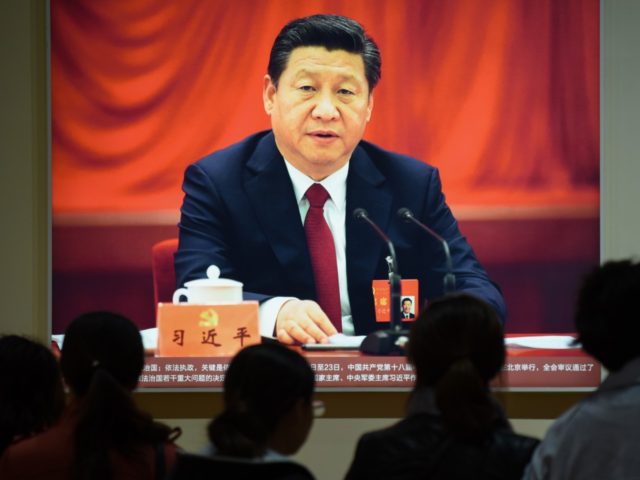China is paying Buddhists in Tibet to hang photos of Communist Party chief Xi Jinping as a means of subverting the grip the religion has among natives in the repressed province, Radio Free Asia (RFA) reported on Monday.
Communist Party officials are reportedly targeting the poorest members of local communities with the program, offering them much-needed financial resources if they agree to worship the Party’s leader. The policy is an extension of a similar program to pressure rural Christians to replace their crosses with images of Xi Jinping first reported in 2017.
An anonymous source from Tibet, but currently in exile due to Chinese persecution, told RFA that they have knowledge of over 30 families in Tibet who China has offered $869 to hang Xi’s photo in a “prominent place” in their homes. The promotion appears to be occurring in tandem with renewed punishments for hanging a portrait of the Dalai Lama in private homes.
Families accept the deal, the source told RFA, “because of financial constraints and poor livelihood opportunities in the area.” Those participating, the source said, “have no choice.”
“They regret this immensely,” the source added.
Tibet has long been the home of a robust independence movement. China claims that it has had sovereignty over Tibet for centuries, a claim some Tibetan independence activists refute and others accept in part. What Tibetan independence activists agree on, however, is that the region has its own culture and ethnic identity, and that the Han supremacist policies of the Chinese Communist Party pose an existential threat to Tibetan identity.
“Residents of both Chinese and Tibetan ethnicity are denied fundamental rights, but the authorities are especially rigorous in suppressing any signs of dissent among Tibetans, including manifestations of uniquely Tibetan religious belief and cultural identity,” according to Freedom House, which has ranked the region “not free.”
Repressing Tibetan Buddhism is a key element of Chinese Communist persecution in the region. Buddhism is a legal religion in China, but only the official “patriotic” branch of Buddhism. Chinese officials and state media regularly refer to the Dalai Lama, exiled in India, as a national security threat and an “Islamic State sympathizer” whose influence it is the “highest priority” for the Communist Party to destroy. To limit the Dalai Lama’s influence, Communist officials have directly intervened in Buddhism by attempting to take control of holy reincarnations. China disappeared a young boy that the Dalai Lama had declared to be the reincarnated form of the Panchen Lama – the second highest authority in the religion – and replaced him with a Communist Party-approved monk.
When international human rights advocates demand information on the missing Panchen Lama, the Chinese government claims that he “does not wish to be disturbed.”
China has also taken measures to control the Dalai Lama that follows the current living Buddha.
“China considers Dalai Lama’s reincarnation as something very important. They have more concern about the next Dalai Lama than me,” the current Dalai Lama told Reuters in an interview in March. “In future, in case you see two Dalai Lamas come, one from here, in free country, one chosen by Chinese, then nobody will trust, nobody will respect (the one chosen by China). So that’s an additional problem for the Chinese! It’s possible, it can happen.”
At the time, the Chinese Foreign Ministry said that the next incarnation of the Dalai Lama should “observe the country’s laws and regulations.”
Chinese authorities have pressured Tibetans to remove photos of the Dalai Lama, likening policies about displaying them to those about pornography, since at least 2016. Law enforcement officials deemed a photo of the religious leader an “illegal publication” that year and forced businesses to remove any displays featuring his likeness. RFA reported last week that the campaign against photos of the Dalai Lama returned in force recently in “remote areas that had previously escaped police attention.” It is now illegal to hang a photo of the Dalai Lama in private homes, not just public businesses.
China launched a similar campaign in 2017 targeting rural Christians. Reports from southeastern Jiangxi province revealed a door-to-door campaign in which officials requested that Christians remove crosses from their homes and replace them with photos of Xi Jinping.
“Many rural people are ignorant. They think God is their savior. … After our cadres’ work, they’ll realise their mistakes and think: we should no longer rely on Jesus, but on the party for help,” local communist official Qi Yan said in state media.
The campaign has since targeted Christian places of worship, where reports indicate the regime requires large photos of Xi Jinping to overshadow crosses.
The repression is part of a campaign Xi’s regime refers to as “sinicization,” the making of all religions more “Chinese.” Xi defines “Chinese” as ethnic Han, Communist Party-approved culture, meaning all religions must worship the Communist Party, and Xi personally, instead of their respective gods. In addition to targeting Christianity and Buddhism, Xi has launched a violent repression campaign against Islam. Islam is an iconoclastic religion, making replacing images with portraits of Xi not an option. Instead, the regime has constructed hundreds of concentration camps to lock in Muslims and force them to eat pork and worship Xi.

COMMENTS
Please let us know if you're having issues with commenting.